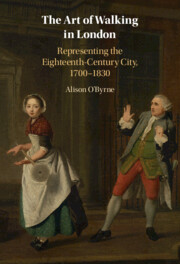Book contents
- The Art of Walking in London
- The Art of Walking in London
- Copyright page
- Dedication
- Contents
- Figures
- Acknowledgements
- Introduction
- Chapter 1 Mobility and Spectatorship in the Early Eighteenth-Century City
- Chapter 2 Promenading the Mall in St James’s Park
- Chapter 3 Imagining the Stranger
- Chapter 4 London Spied
- Chapter 5 Metropolitan Pleasures and Grievances
- Conclusion
- Bibliography
- Index
Chapter 1 - Mobility and Spectatorship in the Early Eighteenth-Century City
The Art of Walking the Streets of London
Published online by Cambridge University Press: 19 December 2024
- The Art of Walking in London
- The Art of Walking in London
- Copyright page
- Dedication
- Contents
- Figures
- Acknowledgements
- Introduction
- Chapter 1 Mobility and Spectatorship in the Early Eighteenth-Century City
- Chapter 2 Promenading the Mall in St James’s Park
- Chapter 3 Imagining the Stranger
- Chapter 4 London Spied
- Chapter 5 Metropolitan Pleasures and Grievances
- Conclusion
- Bibliography
- Index
Summary
Chapter 1 examines John Gay’s Trivia: or, the Art of Walking the Streets of London (1716), offering an account of its distinctive form of mobility and spectatorship and its meditation on poetry’s relationship to commerce. It situates Trivia within a number of early eighteenth-century accounts of London, including Ned Ward’s monthly periodical The London Spy (1698-1700), Tom Brown’s Amusements Serious and Comical, Calculated for the Meridian of London (1700), and Joseph Addison and Richard Steele’s periodicals The Tatler (1709–10) and The Spectator (1711–14) – works which were themselves influenced by various sources including character books, Renaissance coney-catching books, and Alain René Le Sage’s Diable Boiteux (1707). Together, the works examined here offer important models for urban mobility that would be influential to writers and artists throughout the period under discussion.
Keywords
- Type
- Chapter
- Information
- The Art of Walking in LondonRepresenting the Eighteenth-Century City, 1700–1830, pp. 26 - 63Publisher: Cambridge University PressPrint publication year: 2025

